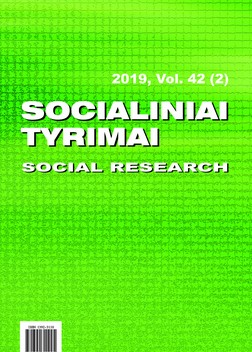Organizacijų transformacijos ir tinklai: sisteminė prieiga
Transformations and Networks of Organizations: Systematic Access
Author(s): Gvidas Petružis, Teodoras TamošiūnasSubject(s): Business Economy / Management, Management and complex organizations
Published by: Vilniaus Universiteto Leidykla
Keywords: Organization transformation; organizational network; small and medium-size enterprises (SME);
Summary/Abstract: Relevance and problem of the study. The article analyses different approaches to organizational transformations and aims to systemize and summarize the existing theories of organizational transformations. Networks of organizations provide access to resources, knowledge and skills from other members of the network, network achievements can be distributed to all network participants. However, the network does not provide equal opportunities for all, mainly supporting those who invest more. Much is determined by different capabilities and abilities of network participants. For small business often find it difficult to become members of the network of organizations. This article therefore raises the scientific problem of how to increase the chances of small business becoming members of the network of organizations and gaining more rights in the activities of such a network. The objective of the paper is to systemize and summarize the scientific theories of organizations’ transformations and networks. Research methods: analysis, structuring, synthesis and comparison of research sources, logical categorization and classification, deduction, interpretation and justification of statements. The transformation of an organization is defined as the implementation of processes aimed at fundamental changes in the organization. Researchers in the organization’s transformations partially compare with the introduction of quality management systems in the organization and their functionality or the theory of the learning organization. The focus is on the dynamic ability of the organization can react flexibly and quickly to the changing internal and external environment. One of the main elements that determines the success of the transformation of the organization is the organization’s manager and his ability to develop his firm as learning organization. Organizations seeking to transform need good theoretical and practical knowledge of organizational transformations. Existing theories and methods are often divided into several types, but none of them is entirely appropriate. By combining several theories, they could provide a more comprehensive theory of the transformations of organizations and, at the same time, enable a better understanding of transformation processes. Science distinguishes four types of organizational transformations: from transformations, when they are managed easily due to the predicted environment, to the most complex scenario, where the environment is chaotic, difficult to predict and changes in the organization must respond more to a changing environment than planning. However, the transformation of an organization is a more planned process than chaotic, so transformation theories can be combined with quality management systems and learning organization theories. The transformation of the organization is highly dependent on the external environment: if the environment is calm and unchaotic, the entire transformation process of the organization takes place by combining short-term plans with the creation of a long-term vision and all this information transferring to the employees. When the transformation of an organization reaches a revolutionary, high level of destabilization, then external processes force organizations to become very flexible.
Journal: Socialiniai tyrimai
- Issue Year: 42/2019
- Issue No: 2
- Page Range: 119-130
- Page Count: 12
- Language: Lithuanian

